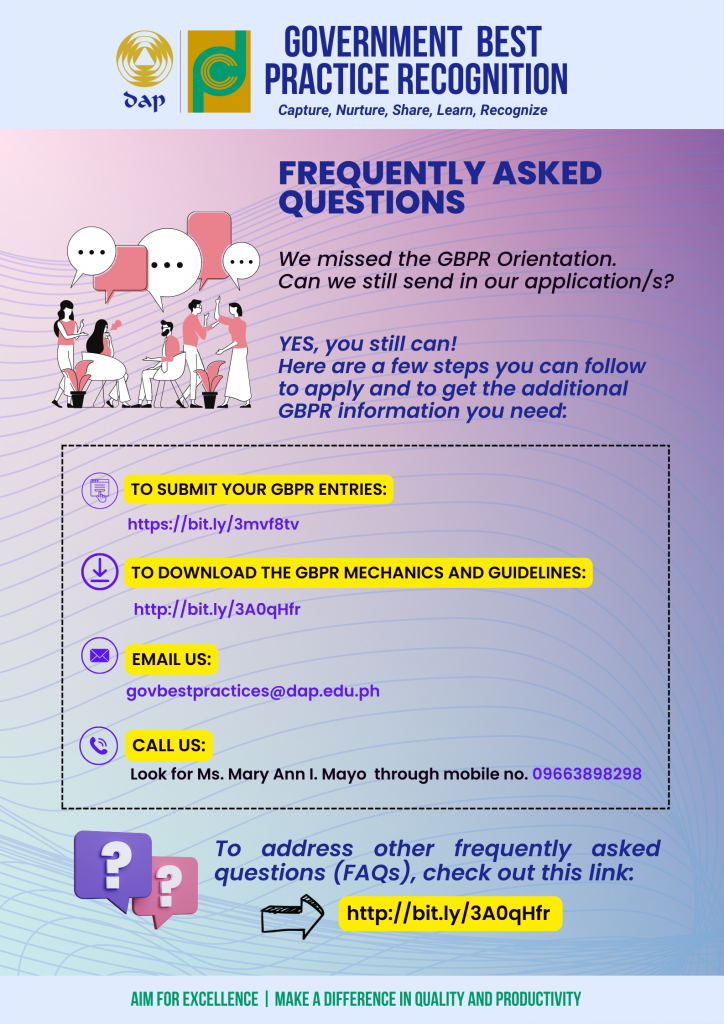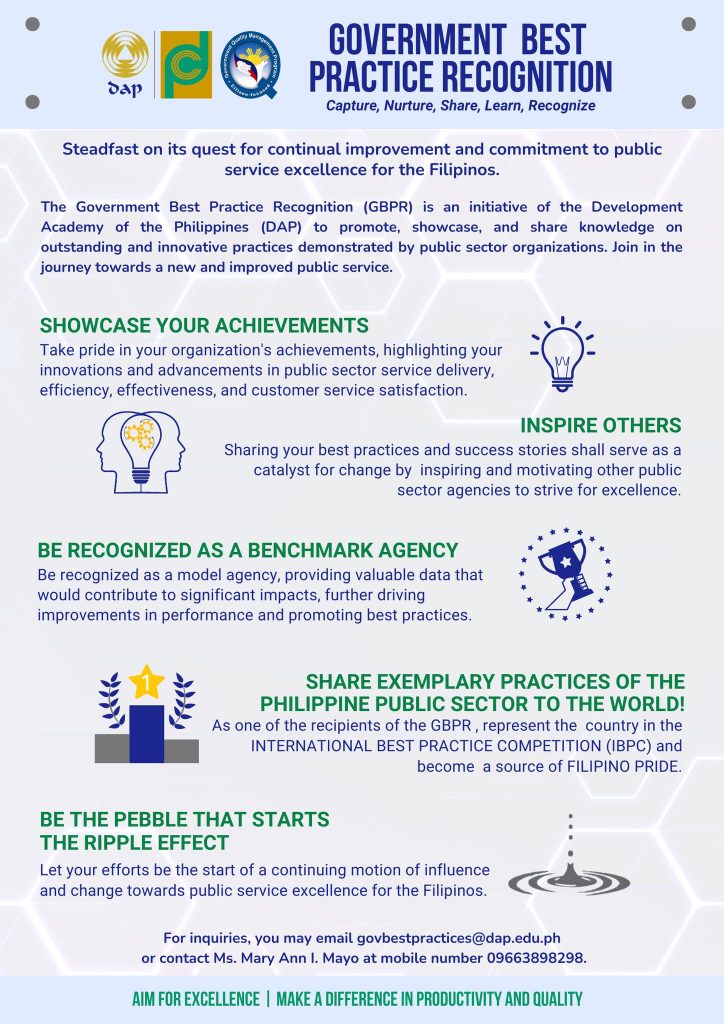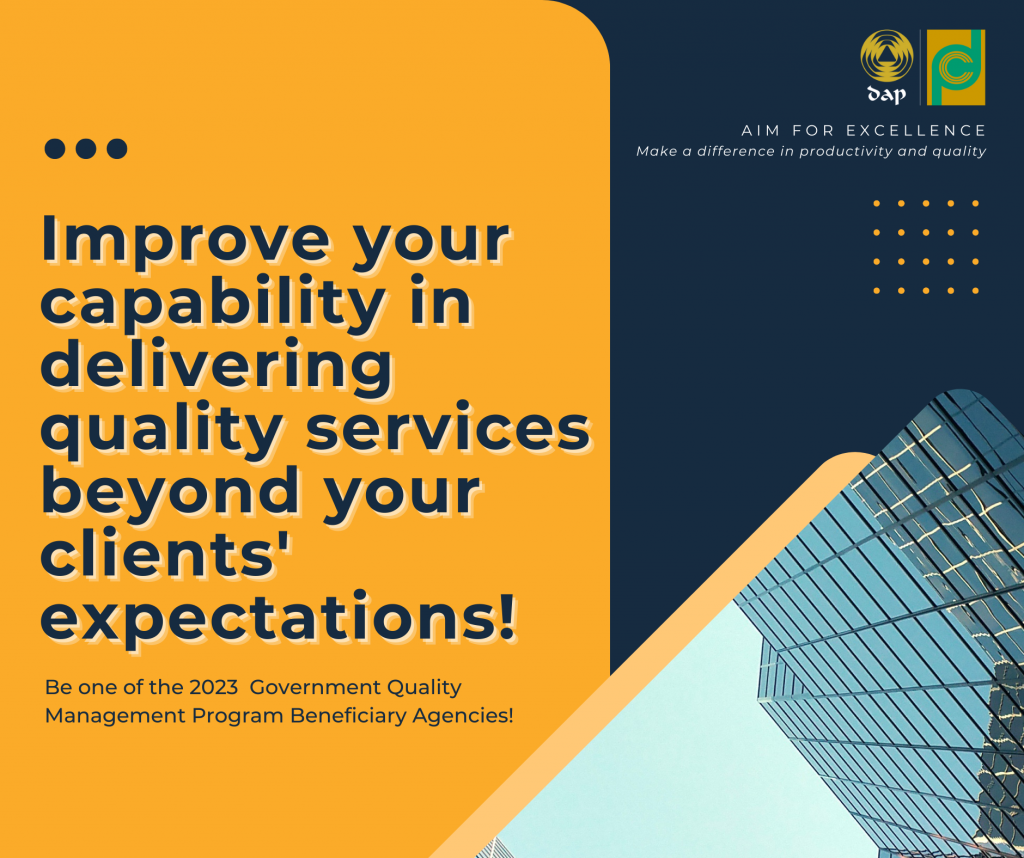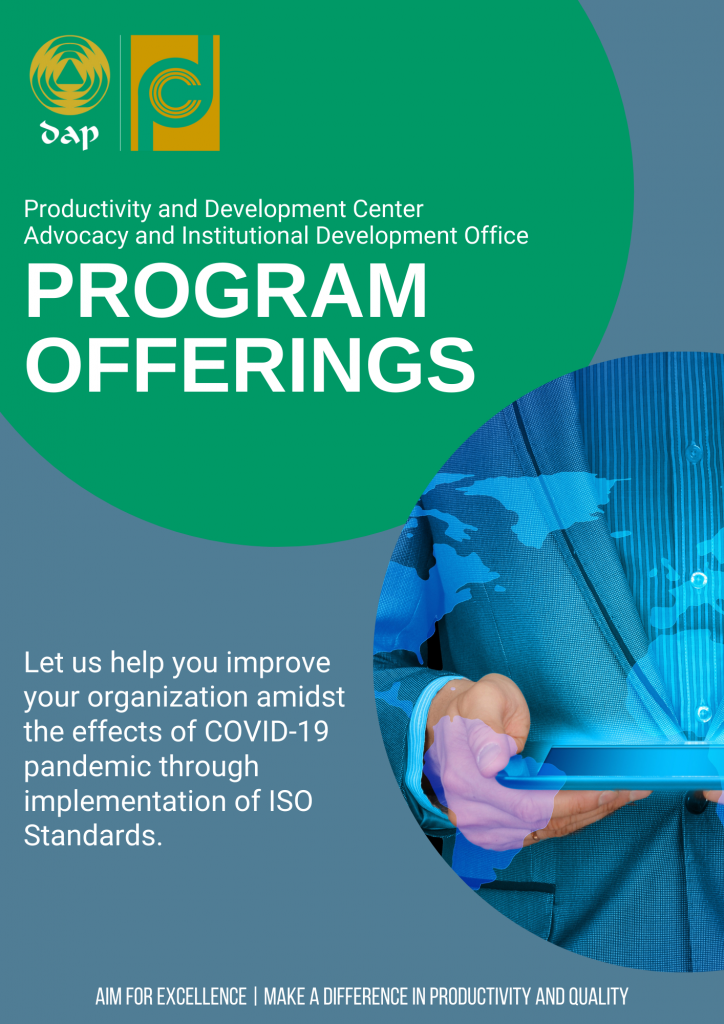Steering the public sector to a more sustainable road towards response and recovery beyond the pandemic was the focus of the back-to-back forum on Public Sector Quality and Productivity Improvement Forum (PSQPIF) and Government Best Practice Recognition (GBPR) held last 16 – 17 December 2021
Conducted by the Development Academy of the Philippines (DAP), on behalf of the Government Quality Management Committee (GQMC), the event revolved on the theme “Public Sector’s Response, Resiliency and Foresight to Overcome Uncertainties Beyond the Pandemic” andreiterated how risk-based QMS can be more agile and adaptive to the demands of the new normal.
The DAP’s President and Chief Executive Officer, Atty. Engelbert C. Caronan, Jr., emphasized, in his opening speech, that risk management is the key to sustain quality and productivity initiatives. The Undersecretary of the Department of Budget and Management, Kim Robert C. De Leon, in his Keynote Address, stressed ‘that amidst the critical issues we face today, primarily caused by the COVID-19 pandemic, it is important to remind ourselves of our achievements and how far we have gone in delivering quality service to the public. All the same, it is equally important that we do not lose sight of our commitment in aiming for higher standards in public service delivery as it is the bare minimum that the Filipino people should expect from their government. It is the bare minimum that they deserve.’


Mr. Ricardo L. Saludo, former Cabinet Secretary of the Office of the Presidentand chairperson of the Civil Service Commission, currently columnist of the Manila Times and Founding President of CenSEI, highlighted how Anticipatory Planning provides the opportunity and platform for Risk-Based Thinking to be used and applied in envisioning what a Future-Ready Public Service Delivery is and what government can do to make it happen.
Atty. Adrian Jude G. Echaus, OIC-Assistant Secretary of the Department of Information and Communications Technology (DICT)touched on howrisk management is applied to data and information security in government. He stressed the government’s efforts to drive digital transformation in the country, making information access widely accessible, reliable and secure. Ensuring protection from the dangers of cyberspace especially for the most vulnerable sectors like the youth and those with limited digital literacy was also emphasized during his presentation.
The application of risk management in planning and its impacts to sustainability was discussed by Ms. Veronica Gabaldon, Executive Director of the Philippine Disaster Resilience Foundation (PDRF), expounding on their Business Continuity and Organizational Resilience Program which has customized business continuity planning for different sectors and published guidebooks that highlight internal capacities, recovery requirements and strategies of an agency or institution that leans towards the continuous delivery of quality public service during an emergency or disaster.
Adopting service quality standards (SQS) to reinforce risk-based thinking was next discussed by Ms. Monica D. Saliendres, DAP’s Fellow and Director of Productivity Development Research Office (PDRO). Her presentation dwelt on several key points namely; Risks on Frontline Government Service Delivery (gleaned from a quick survey conducted among the forum attendees), Defining Service Quality Standards, Managing Risk through Service Quality Standards, and Risk-Based Thinking for Continuous Improvement on Frontline Government Service Delivery.
The advancement of risk-based policy, planning, and implementation, on the other hand, was pushed by Mr. Ronald Hugh Jackson, Head of the Disaster Risk Reduction & Recovery Team (DRRRT) for Building Resilience in the United Nations Development Program (UNDP) in Geneva, Switzerland. Mr. Jackson said that the pandemic has exposed flaws in the management of risks and that various governments around the globe are taking steps to solve that. We are living in a world of complex and interconnected risks and the challenge for policy maker and community leaders is that the risks are changing at a rapid rate rendering traditional approaches increasingly ill suited.
Day two of the event was the Government Best Practice Recognition (GBPR), which provided a knowledge sharing platform on the GBPR selected recipients on the COVID-19 Response. The presenters for best practices for COVID-19 Response for 2020- 2021 were as follows: Bayanihan E-Skwela (Community Learning Hubs) and Free Shuttle and Ferry Service for Frontliners Project, by the Office of the Vice President of the Philippines; The DOST Davao Region Pandemic Manual by the Department of Science and Technology (DOST) Region XI; The UP Diliman COVID-19 Response Framework ; Puerto Princesa City Jail’s Tech4Ed Center E-Services by the Bureau of Jail Management and Penology MIMAROPA; and The Happy HR aPPP by the Local Government Unit of General Santos City.

The event culminated with the recognition ceremony of past and current recipients of the GBPR and GBPR COVID-19 Response from 2018, 2019, 2020 and 2021.
For details on the different best practices submitted, please visit the COE-PSP Knowledge Bank: https://coe-psp.dap.edu.ph/knowledge-bank/
XXX

















